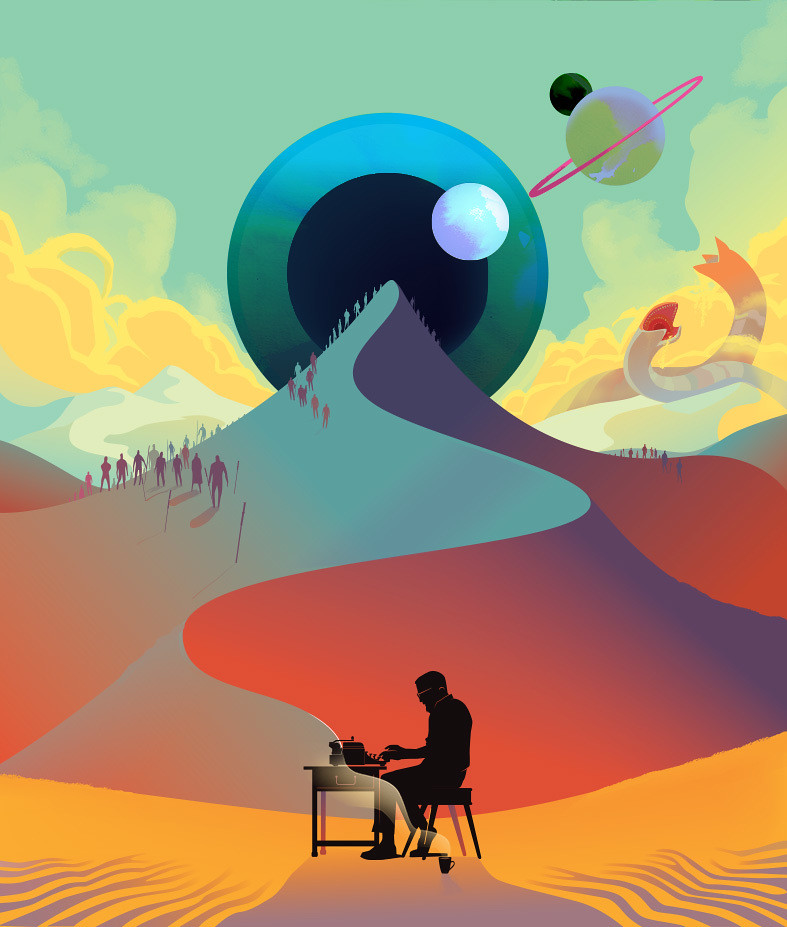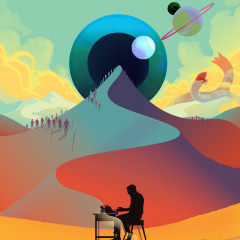 The novel Dune was first published by the Chilton Publishing House in 1965. The story follows the adventure of Paul Atreides, the heir to a galactic noble family, the house Atreides. Set on the planet Arrakis, the story follows Paul as he must survive an unimaginable harsh wilderness whilst being beset on all sides. Paul and the enigmatic Lady Jessica must journey across the shifting dunes of Arrakis, all while contending with the deadly sandworms that inhabit the planet and avoiding the forces of their arch-nemesis, the Baron Harkonnen.
The novel Dune was first published by the Chilton Publishing House in 1965. The story follows the adventure of Paul Atreides, the heir to a galactic noble family, the house Atreides. Set on the planet Arrakis, the story follows Paul as he must survive an unimaginable harsh wilderness whilst being beset on all sides. Paul and the enigmatic Lady Jessica must journey across the shifting dunes of Arrakis, all while contending with the deadly sandworms that inhabit the planet and avoiding the forces of their arch-nemesis, the Baron Harkonnen.
Paul has the power of foresight and can see his destiny unfold before him as he becomes the legendary Paul Muad'Dib. He must grapple with the knowledge that he will be the cause of a galaxy-wide Jihad led by his iconic followers, the Fremen – the battle-hardened people of Arrakis.
Dune is widely considered a sci-fi classic, winning both the Hugo Award for best novel in 1966 and the Nebula Award for best novel in 1966. Frank Herbert spent six years researching Dune, and according to mycologist Paul Stamets, Frank Herbert's experience with psilocybin acted as a great source of inspiration for the Dune saga.
Frank Herbert enjoyed considerable commercial success throughout the 1970s and 1980s, allowing him to commit to being a full-time writer by the end of 1972. A myriad of sequels followed Dune: Dune Messiah, Children of Dune, God Emperor of Dune, Heretics of Dune and Chapterhouse Dune.
Dune's long-lasting legacy can be attributed to Frank Herbert's willingness to approach complex ideas and themes within his work. The Dune saga explored concepts such as religion, philosophy, politics and ecology. These themes have become ever more prevalent since Frank Herbert's death. For example, within Dune, Frank Herbert explored the human tendency to follow slavishly charismatic leaders, which the western world has been privy to in the last decade. When Dune was published, it was at a time when the American people still had faith in the government institutions and deified their politicians. He later elaborates on this notion in this quote.
“For that reason, I think that John Kennedy was one of the most dangerous presidents this country ever had. People didn't question him. And whenever citizens are willing to give unreined power to a charismatic leader, such as Kennedy, they tend to end up creating a kind of demigod . . . or a leader who covers up mistakes—instead of admitting them—and makes matters worse instead of better.” Frank Herbert
A core focus is placed on the concept of human survival and evolution, which is demonstrated by the Sardukar and the Fremen within the Dune novels. Harsh environments mould these almost superhuman beings to become a terrifying military force where the whole galaxy bends to their will.
Much of Frank Herbert's legacy lives on with the sci-fi work it inspired. Dune was one of the first ecological science fiction novels that helped popularise the term ecology and some of the concepts within the field. Many of Frank Herbert's fans attribute Dune to introducing them to philosophy and psychology.
As with most highly successful books, Dune solicited a major movie adaption before Frank Herbert's death in 1986. David Lynch created his vision of Dune, which was met with poor critical acclaim, often being considered a jumbled mess of ideas by film critics. There was also a short-lived mini-series of Dune in the 2000s, which is widely considered a more faithful adaptation of Frank Herbert's work, starring a young James McAvoy before his X-Men days.
Another Dune adaptation directed by Dennis Villeneuve was set to debut at the 78th Venice International film festival, but due to Covid-19, the film's release was delayed. The film has a star-studded cast with Timothee Chalamet, with Oscar Isaac, Josh Brolin and Dave Bautista all starring in key roles.
Even after Frank Herbert's death, it is clear his ideas live on within the hearts and minds of those who have read and loved his work. Regardless of the critical reception of the upcoming movie, it is evident that Dune and its sequels have touched the hearts and minds of thousands across the globe and surrounded them within the mystery that is the world of Arrakis.







0 Comments